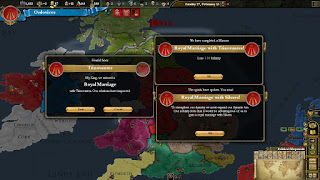This is the world in the year 16 A.D. Rome rules uncontested over the continent, with a few Germanic tribes in the north being their only real opposition, though slight. The british isles remain divided between multiple tribes.
The most important of which is, of course, the Ordovices. Obviously.
In order to produce more income to pay off these loans, he organises the construction of various building projects. Roads, farmlands, and clearings are built all across the Ordovices, generating income for the king.
In the meantime, the Ordovices also married into the noble families of Domonia.
However, despite the good events, this came tied in with the bad. Maredudd's increased centralisation of the realm in order to generate more income to supply the ships and the loans angered the nobles, who demanded increased privileges in their land.
Not wanting to face a costly rebellion, Maredudd decided to grant them more control over their own plots of land.
King Maredudd receives news of a new city, formerly a minor trading post, raised to significance by the Romans. Antwerp, a city on the northern coast of the Roman Empire, has became a major centre of trade, and King Maredudd wants some of this trade. He sends several merchants there, and becomes one of the dominant trading powers there - as with Rome, second only to the Romans.
The king orders the building of a corduroy road in the city of Liverpool. Only after handing over the gold to construct it, he realises his blunder - with the money spent on the construction of the road, there is none left to repay the merchants, who will soon be demanding their money paid back in full.
Maredudd runs to the treasury, and demands the minting of more coins. This will cause a lot of inflation in the economy, but the price of failing to pay a loan could be much worse.
This pays off, and by the time the loans need to be repaid, there is enough money in the treasury to do so.

















